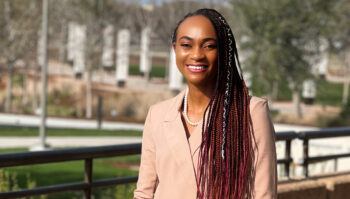Helping Students With Children Succeed In College

When talking to Kobi Ajayi, it doesn’t take long to realize she is passionate about changing the world. A recent graduate of Texas A&M University’s School of Public Health, she is the epitome of someone who wants to enact change, and she leaves little doubt she can accomplish whatever it is she sets her sights on.
Ajayi, who received her doctorate this past weekend, took what she refers to as a non-traditional, or non-linear path to College Station, arriving after spending 10 years in the working world and having started a family.
While it wasn’t the normal path, it was a path that inspired Ajayi to look for ways to help students such as herself who were dealing with the challenges that come with being a student as well as a parent.
“There is a growing number of students who are termed non-traditional students, people like me who work before coming to the university, and who have a family,” Ajayi said. “People like me come to the university wondering, ‘Why do I feel alone in this place?’”
Ajayi recounts the struggles she and her family faced when they came to Texas A&M. Although the university’s orientation program did provide information, she felt the majority of it was aimed toward the younger, more traditional students who were enrolling in the university.
There was no information, she recalls, about available childcare in the Brazos Valley for students who needed it.
“Parenting students are more likely to drop out from higher education because of the burdens of managing conflicting schedules,” Ajayi said. “Being a parent and student, working and managing life without information about available childcare resources, information on how to navigate class schedules, or whether a parent can bring their child to class can be challenging. Without the right support system both from the institution and at the home front, parents drop out from attaining the one thing that can give them the life they and their family deserve. It is a conundrum for student parents.”
Using her own experiences to guide her, Ajayi set out to find a way to help those students. She arranged focus groups with parents to learn about their complaints and issues they faced as well as the resources they needed.
Additionally, Ajayi used a $1,000 fellowship grant to create an organization that helped these individuals by providing gift cards for groceries.
“We didn’t have much, but we supported students with what we could,” Ajayi said. “We also provided scholarships and connected students with resources on and off campus. For example, we partnered with Early Head Start to come to campus to educate the students about its programs and eligibility criteria.”
When Ajayi started the organization in 2019, it was a solo venture. Since that time, the Aggie Pregnant & Parenting Student Organization, has grown to include five executive leaders — three moms and two dads — as well as more than 50 student volunteers.
“When I started it was just me, but thankfully, when something is good it attracts people,” Ajayi said.
The organization received a grant from Texas A&M University’s Good Bull Fund, allowing it to expand the financial help it provides. The grant has also allowed the organization to host its first networking event for student parents at Texas A&M.
“My principle is, ‘Be a change agent around your bubbles,’” Ajayi said. “We are making the world a better place one bubble at a time.”
Ajayi will be honored for her work as one of this year’s recipients of the Buck Weirus Spirit Award. The award, which is presented by The Association of Former Students, honors 55 students each year who demonstrate high involvement, create positive experiences throughout the Aggie community, impact student life at Texas A&M and enhance the Aggie spirit. Unlike other awards, the Buck Weirus Spirit Award recognizes those students who make contributions to the university through participation in student organizations, Aggie traditions and university events.
“I am very passionate about a fair and equitable world. The School of Public Health, at every point, from my MPH to my Ph.D., has been very supportive,” Ajayi said. “When you are in the School of Public Health you can boldly say, ‘impossible is nothing.’”
This article by Tim Schnettler originally appeared on Vital Record.





